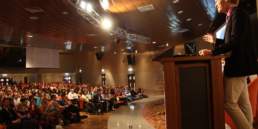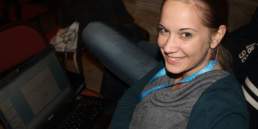He was the face of AEGEE’s Summer Universities in the early 90ies: Vittorio dell’Aquila. In 1989 – just one year after this event type was created – he took care of the coordination of all courses together with a couple of members of his antenna, AEGEE-Milano. He joined the CD, was Vice-President of AEGEE-Europe, but even there he continued the SU task until the mid-90ies. For this he was awarded honorary membership of AEGEE-Europe. Today, the 46-year old linguist lives between Vaasa in Finland and Cislago, north of Milan.
Golden Times: Vittorio, when did you become Coordinator of the Summer Universities?
Vittorio dell’Aquila: I don’t know in which year: it was the summer after Frank Biancheri had left the presidency of AEGEE.
Golden Times: That was 1989, the second year of the creation of the Summer Universities. Which was the first SU that you visited?
Vittorio: I never visited any SU as a participant.
Golden Times: Which was the first one you organised?
Vittorio: It was in Milan in 1989, the same year in which we took the responsibility of the coordination of all the SU.
Golden Times: How come that you got involved in the SU Coordination?
Vittorio: There were problems in the communication between the CD and the first SU coordination, especially about money. AEGEE-Milano decided then to take over the coordination covering locally all possible expenses.
Golden Times: What motivated you personally to get involved?
Vittorio: I liked to organise events. And I still do.
Golden Times: Who was in your Summer University Coordination Team?
Vittorio: It was Summer University Coordination then, not SUCT yet. In our team were mainly two or three other members of AEGEE-Milano, among them always Silvia Negrotti and Francesca Guerrini, plus many others, who were not only from Milano. They helped in case of necessity.
Golden Times: At that time, there was no electronic applications yet and there were no SU descriptions online. How did the system work?
Vittorio: With printed booklets, sent by snail mail. After the second or third year a Dos programme for the registrations was sent in a floppy disk to all the antennae by mail too. This programme was developed by AEGEE. However, almost half of the antennae did not have any computer and used only paper registration forms. All data were then typed or imported into a relational database in Milano – mainly at my place during the nights.
Golden Times: This means you did the complete pre-selection?
Vittorio: The computer did it out of certain parameters, such as the three choices, the original antenna, the mother tongue of the applicant and – if applicable – the level of knowledge of the target language.
Golden Times: How did you let the antennae the result of the preselection know? Did you bring them to the Agoras, like Mauro Bartoletti’s team did in the late 90ies?
Vittorio: No, it was done by snail mail and telephone.
Golden Times: Which principles did you apply to make the pre-selection as fair as possible?
Vittorio: For outgoing members there were three parameters. The first one was the type of local: antennae, contact-antennae and contacts – relatively more members were accepted from the antennae, less from the contacts. The second parameter was the number of applying members: there was an inverse proportionality between the number of applications and the percentage of preselected people. The third parameter was the degree of local activity of the members: local board members had priority. For incoming members the pr-selection worked as follows: inside each course we wanted to have the best possible balance among speakers of different languages as mother tongue and the antenna of origin.
Golden Times: You also created the SU booklets?
Vittorio: No, actually the first one had been done by the SU coordination at AEGEE-Maastricht.
Golden Times: The SU Booklets of the 90ies contained a bilingual description of each SU: the original on one page, English on the next. Did you introduce it?
Vittorio (smiles): Of course.
Golden Times: How did that work?
Vittorio: The antennae did everything – with their very original translation! But not for our first year as Summer University Coordinators: then the AEGEE network helped for the translations.
Golden Times: Wasn’t it difficult to collect all translations?
Vittorio: Not so much. It was actually one of the most amusing things to do.
Golden Times: You also wrote the intro part of the SU books, which was in many languages. In how many languages?
Vittorio: I have no idea.
Golden Times: I think it were nearly 20. How many SUs were organised then per year?
Vittorio: I think that the last year in which I was the “official coordinator” we had more than 80 courses for about 15 languages plus other subjects.
Golden Times: Were there certain developments or trends of the content of Summer Universities?
Vittorio: I would say that the average level of language tuition was declining and the main aim of the SU, after some years, was not anymore learning a language or another subject but just holiday and fun.
Golden Times: Which SUs do you remember as outstanding or role-model even for today?
Vittorio: In the first years, maybe after the second year, the majority of the Summer Universities were quite well organised – some for the tuition level, some for the organisation, some for both. Then a number of “last-minute organised” Summer Universities joined the project – we have even excluded some courses from the booklet. I remember the worst ones, but I will not tell you.
Related Posts
1st August 2019
The Gallery of All Presidents of AEGEE-Europe
Here is the gallery of all Presidents of AEGEE-Europe - with photos of every one of them. Enjoy the list!



